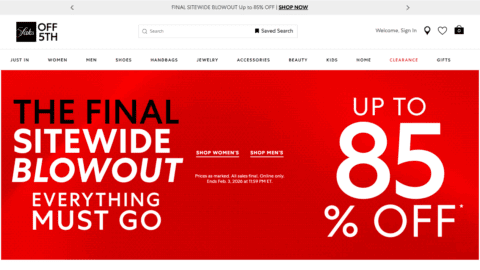The beleaguered sporting goods industry took yet another hit as specialty golf retailer Golfsmith filed for Chapter 11 bankruptcy protection on Sept. 14. With 109 U.S. stores and 55 Golf Town stores in Canada, the company will reorganize in part by selling the Canadian stores to an investment group led by Fairfax Financial Holdings.
It is unclear what the future will hold for the U.S. stores. The reorganization plan calls for the closure of certain underperforming stores and the sale of excess inventory, according to a company press release. If Golfsmith fails to attract a buyer by Oct. 31, the company could face immediate liquidation.
This year hasn’t been kind to sporting goods retailers as a whole, with former vertical leader Sports Authority and Sport Chalet shuttering operations. Dick’s Sporting Goods, the new leader in the space, scooped up the Sports Authority brand and is rumored to have interest in purchasing the Golfsmith brand. Considering Dick’s already owns the Golf Galaxy chain, this would be a big power play toward making the brand the country’s primary golf equipment seller.
If anything, the bankruptcy shows how volatile specialty retailing can be if it’s not at least somewhat diversified. Specialty retail, regardless of the vertical, can carry risks in terms of scalability. Sporting goods retailers have already faced difficulties trying to compete in the same environment as the Amazons and Walmarts of the industry, but retailers that focus specifically on individual sports have an even greater hurdle to clear because there is always the danger of becoming a niche seller. If popularity is down among consumers and the retailer covers a large base, sales and store traffic are both very likely to decline.
While 30 million people played golf in 2005, that number declined to 24 million in 2015, according to the National Golf Foundation. So while golf is still much more than a “niche” experience, a 20% participation decline over a 10-year span is certainly reason to be alarmed. With only a select few major sporting goods retailers left, golf as its own specialty retail niche appears to be less viable. Another indication of the sector’s woes is that the brands that have supplied these retailers appear to have lost confidence that golf can come back up to par.
Adidas, a major player in the golf industry as the owner of brands such as Taylor Made, Ashworth and Adams, expressed interest in selling these brands in May 2016. Nike is exiting the golf equipment business altogether after concluding its fiscal 2016 with its lowest revenue since 2011, instead focusing entirely on golf apparel and footwear.












